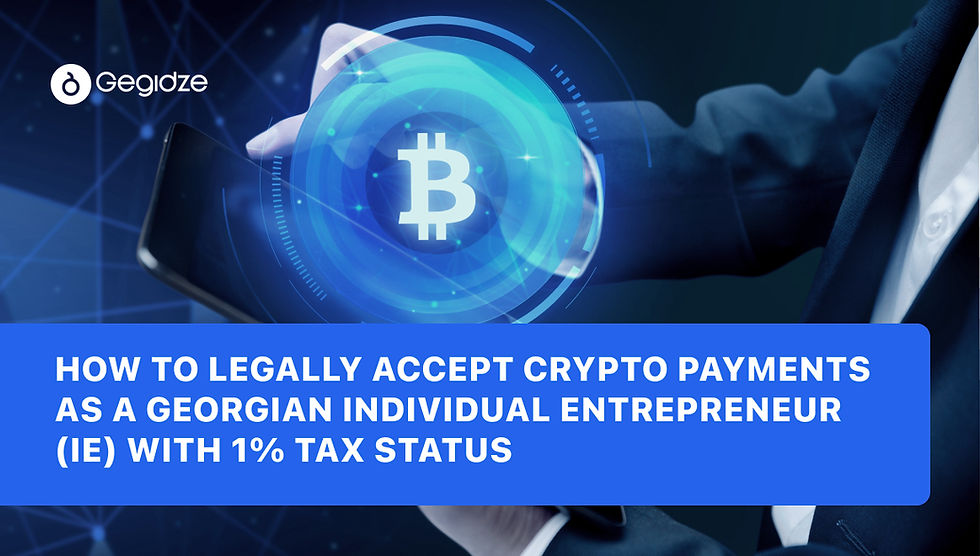Source of Crypto Funds (SOCF): Documenting Crypto History for Exchange and Banking Compliance
- Tinatin Tolordava
- Dec 5, 2025
- 6 min read
Table of contents
Why SOCF Matters More Today Than Ever
If you are active in crypto and living or doing business in Georgia, you already know the truth. Banks, exchanges, and regulators are looking much harder at Source of Crypto Funds (SOCF). This is the number one requirement for smooth crypto to fiat conversions, account openings, and transfers.
Georgia is a crypto friendly country with low taxes, simple registration, and a strong position as a regional hub for Web3 and fintech. But compliance still matters. If you cannot prove the history of your crypto funds, you will run into problems with Georgian banks, global exchanges, and the National Bank of Georgia.
SOCF is not complicated once you understand what banks and exchanges want to see. This guide breaks it all down in a simple way, packed with practical steps and everything an Individual Entrepreneur, a crypto trader, a contractor, or an international founder needs.
What SOCF Actually Means
SOCF stands for Source of Crypto Funds, a compliance requirement that proves where your crypto originally came from. Banks and exchanges use SOCF to check that your crypto:
Has a transparent transaction history
Is not linked to illegal activity
Comes from legitimate income or investments
Matches your declared earnings and tax records
In Georgia, SOCF is crucial for:
Cashing out crypto to Bank of Georgia or TBC Bank
Passing Bank of Georgia KYC and AML checks
Opening a crypto friendly business account
Applying for a VASP license Georgia
Filing taxes correctly as an Individual Entrepreneur
Using crypto as part of an Employer of Record in Georgia structure
If you cannot provide SOCF, banks may freeze your payment, reject your transaction, or request additional documentation.
Why Georgian Banks Ask for SOCF
Georgia is known for flexible regulations, simple taxes, and a crypto friendly environment. But banks still follow strict compliance standards. This includes top 10 banks in Georgia, especially Bank of Georgia, TBC Bank, BasisBank, and Liberty Bank.
They ask for SOCF to:
Prevent money laundering
Meet financial regulations set by the National Bank of Georgia
Align with global FATF standards
Confirm your crypto activity matches your tax identification number Georgia profile
Validate that your transfers correspond to your declared business activities
What SOCF Documents Do Banks and Exchanges Want
SOCF documentation varies depending on the size of the transfer, the type of crypto activity, and your business structure. Here is what Georgian banks normally request.
1. Wallet Transaction History
Banks often want the full history of the wallet sending crypto. This includes:
Dates of transactions
Incoming and outgoing transfers
Wallet addresses
Amounts
Token types
Block explorers like Etherscan, Tronscan, and Blockchain.com are acceptable sources.
2. Exchange Account History
If your crypto passed through centralized exchanges, provide:
Deposit history
Withdrawal records
Trade history
Fiat purchases
KYC approval screenshots
This is often required for people receiving crypto as business income.
3. Proof of Purchase
For crypto purchased with fiat, banks may ask for:
Credit card statements
Bank statements
Receipts from Binance, Kraken, Coinbase, etc.
4. Service Invoices
If your crypto came from clients, especially if you operate as an Individual Entrepreneur, you must show invoices matching the crypto payment.
This is where interlinking becomes relevant. See the Gegidze article.How to Legally Accept Crypto Payments as a Georgian Individual Entrepreneur (IE).
5. Employment or Contract Agreements
If you earn crypto through work, banks want:
Contract
Salary agreement
Employer information
This is especially relevant for companies using Employer of Record Georgia or Employer of Record Azerbaijan.
6. Tax Declarations
If you are a Georgian IE, banks will check that your crypto income matches your monthly turnover declarations. Learn more in Gegidze’s guide.Converting Foreign Income to GEL for Tax Purposes.
SOCF Requirements for IEs with 1 Percent Status
If you operate as a Georgian Individual Entrepreneur with Small Business Status, every crypto payment you receive must be declared as turnover.
Here is what you must provide for SOCF:
Invoice to the foreign client
GEL calculation based on Revenue Service exchange rate
Wallet screenshot showing receipt
Exchange withdrawal proof if converting to fiat
Monthly declaration filed with the Revenue Service Georgia
This structure ensures that your crypto revenue aligns with your declared income. Banks in Georgia fully support crypto cash-outs when compliance is consistent.
SOCF for LLCs and Crypto Businesses
If you operate through an LLC, especially if you handle crypto for clients, SOCF becomes much more detailed.
You may also need:
Company registration in Georgia Tbilisi
Accounting records
Corporate contracts
Detailed AML policies
Compliance reports
Proof of operational structure
This is essential for companies applying for:
Crypto license Georgia
VASP license Georgia
Obtaining a crypto license in Georgia
Forex license in Georgia
If your business activity fits a regulated category, Gegidze also supports the full VASP and licensing process.
When SOCF Issues Become a Real Problem
SOCF problems can shut down your operations if not handled early. Here are the most common issues people face.
1. Old wallets with missing history
If you used wallets many years ago and cannot prove origin, banks may reject the cash-out.
2. Mixed wallets
Using the same wallet for personal investments, business payments, and gifts creates confusion. Always separate them.
3. Unreported crypto income as an IE
If your crypto payments do not match your tax declarations, banks will question it.
4. Transfers from exchanges with weak KYC
Transfers from unregulated offshore exchanges create red flags.
5. Missing invoices
Many freelancers forget this step and cannot prove their work. Learn how to fix this in Gegidze’s blog.How to Legally Accept Crypto Payments as a Georgian Individual Entrepreneur.
How to Prepare Perfect SOCF Documentation
To avoid problems and ensure smooth banking, follow these steps.
Step 1. Keep every invoice
Every crypto payment for your services requires a clear invoice.Tip. Use a consistent invoice template in English and Georgian.
Step 2. Track your wallet history
Export the full wallet history monthly.
Step 3. Maintain your exchange account records
Download CSV files regularly.
Step 4. Keep bank statements clean
If you move fiat from crypto, match each transfer with documented SOCF.
Step 5. File your taxes correctly
If you are an IE, declare your GEL turnover monthly.If you are a company, maintain proper accounting.Interlink:Closing or Liquidating an Individual Entrepreneur in Georgia.
Step 6. Use stablecoins to simplify calculations
USDT or USDC reduce volatility issues with SOCF.
How Gegidze Helps You Pass SOCF Requirements Smoothly
Gegidze helps individuals, freelancers, and businesses provide perfect SOCF documentation. Our services include:
Preparing SOCF files for Bank of Georgia and TBC
Matching crypto payments with tax declarations
Setting up compliant invoicing systems
Translation of documents into Georgian for Revenue Service submissions
Registering IEs and LLCs and providing full compliance support
Applying for crypto licenses or VASP licensing
Structuring payroll for global teams using Employer of Record in Georgia
You get a clear, clean, audit ready record that satisfies banking and regulatory standards.
If you want smooth crypto to fiat banking in Georgia, you need clean SOCF documentation.
Book a free consultation with Gegidze and let us prepare everything for you.
From crypto invoicing to tax declarations and banking compliance, we handle all the details so you can work without stress.
Frequently asked questions (FAQ)
What is Source of Crypto Funds (SOCF) and why do Georgian banks require it?
SOCF is documentation that proves where your crypto originally came from. Georgian banks like Bank of Georgia and TBC Bank require SOCF to comply with AML laws, verify transaction legitimacy, and confirm that your crypto activity aligns with your tax identification number Georgia and declared income. Without SOCF, cashing out crypto or opening accounts may be delayed or rejected.
What SOCF documents do I need for cashing out crypto in Georgia?
You may need a combination of wallet transaction history, exchange trading records, invoices for services, employment contracts, bank statements, and GEL turnover declarations if you operate as an Individual Entrepreneur. These documents help banks confirm that your crypto funds match your declared earnings under Georgia country taxes.
Can SOCF problems affect my Small Business Status or IE compliance?
Yes. If your SOCF records do not match your IE invoices or monthly declarations, the Revenue Service Georgia or Georgian banks may flag your file. SOCF mismatches can affect georgia small business status 1 percent tax 500,000 gel 2025 and may trigger additional compliance checks.


